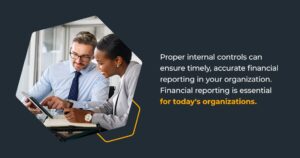Reading Time: 3 minutes
Internal control is a plan or system of accounting and financial organization. It comprises the measures and methods needed to safeguard assets, check the accuracy of accounting data, and substantiate financial statements. It also lets you police previously adopted procedures, policies, and rules regarding effectiveness and compliance.
Internal Control Activities
Internal control activities are essential to any organization and crucial to its ability to drive operations and measure success. Internal controls are the key policies, rules, and procedures that establish and promote accurate financial reporting, compliance, and operational effectiveness and efficiency.
Proper controls help organizations detect and prevent negative occurrences that can risk their assets’ protection. Five key components make up the framework for strong and effective internal controls — risk assessment, control environment, control activities, monitoring, and information and communication.
The internal control activities are at the heart of proper policies and procedures that prevent and protect the organization from errors, issues, and fraud:
- Separation of duties: This measure is essential to reduce the odds of errors and the risk of fraud. Separation of duties divides accounting processes and tasks for bookkeeping, deposits, and authorizations. Effective separation of duties divides certain actions or steps within a key process among multiple individuals.
- Authorization: Proper authorization practices can help prevent invalid transactions. Approval for transactions is a crucial control measure to ensure all activities adhere to objectives and guidelines and to prevent theft or fraud. When you require individuals to authorize specific types of transactions, you produce an internal record. That record shows that the appropriate authority reviewed and approved an activity before processing or payment.
- Documentation: Documentation is essential to properly maintaining internal controls. It lets you establish accounting procedures and their ownership, process steps, and associated rules. Documentation also provides an internal record of necessary actions, along with who should carry them out and in what order so you can carry them out consistently, accurately, and completely. Document your organizational transactions related to revenues, expenses, inventory, and personnel.
1. Accurate Financial Reporting
Proper internal control activities can ensure timely, accurate financial reporting in your organization. Financial reporting is essential for today’s organizations. It provides valuable analysis and insights, ensures your organization remains compliant, and shows your organization’s economic position and performance.
You may have to prepare and file financial reports with regulatory agencies. Your financial statements should include information on your organization’s assets, equity, liabilities, and how your organization spent its revenue.
The benefits of accurate financial reporting include the following:
- Accurate financial reporting can help differentiate your organization by illustrating what sets you apart.
- Internal and external reviews may use financial reports to hold staff members accountable for their performances and actions.
- You can use accurate financial reports to gain actionable and specific insights into your organization that will help you operate more efficiently.
- Accurate financial reports can help identify trends in your finances so you can make better decisions for your organization.
- Your financial statements can provide insight into revenue recognition and whether you’ve correctly recorded your revenue, which is essential for financial reporting and taxation purposes.
2. Compliance
Internal control compliance can mitigate risks and give your organization a greater chance of reaching its objectives. Well-designed key internal controls can keep your organization operating effectively and efficiently while complying with regulations.
Accounting compliance standards are policies and rules that help organizations maintain accuracy and ensure security. You can conduct an audit to ensure your organization is compliant with rules and regulations. You may review the following during a compliance audit:
- Payroll
- Data security
- Financial records
- Management standards
- Health and safety policies
Upholding accounting standards and complying with financial regulations is crucial. Follow the tips below to avoid compliance risks in accounting:
- Address issues: Issues can sometimes arise if staff members are unfamiliar with a procedure or a glitch occurs in the system. Put a plan in place to address any problems and keep your organization in compliance. Ensure your plan includes any necessary training and disciplinary action.
- Get audit-ready: You want to be prepared in case of an unplanned audit. Regular internal audits will keep you up to date on where your organization stands and let you correct any issues before an external audit occurs.
- Review the standards: If you’re going to comply with standards, you need to understand what they are. Review applicable standards and keep up to date with your industry’s regulations.
3. Operational Effectiveness and Efficiency
Improved effectiveness and efficiency can benefit your organization’s finance and accounting operations. Digital transformation and modernization can help. Automation technologies can streamline processes and digital transformation can help your organization avoid disruptions due to remote work.
Automation has made finance functions like accounting, payroll management, and transaction processing more efficient. Consider replacing or augmenting traditional finance tools like spreadsheets and ledgers with more advanced technology. MIP Accounting® can help your organization improve its operational effectiveness and efficiency. Our cloud-based fund accounting solution is ideal for nonprofit organizations.
Request a Demo of MIP®
Learn more about the best practices around the five key components of internal controls and control activities within our Internal Controls for Nonprofits guide, or request a quote from us at MIP Accounting® today.






